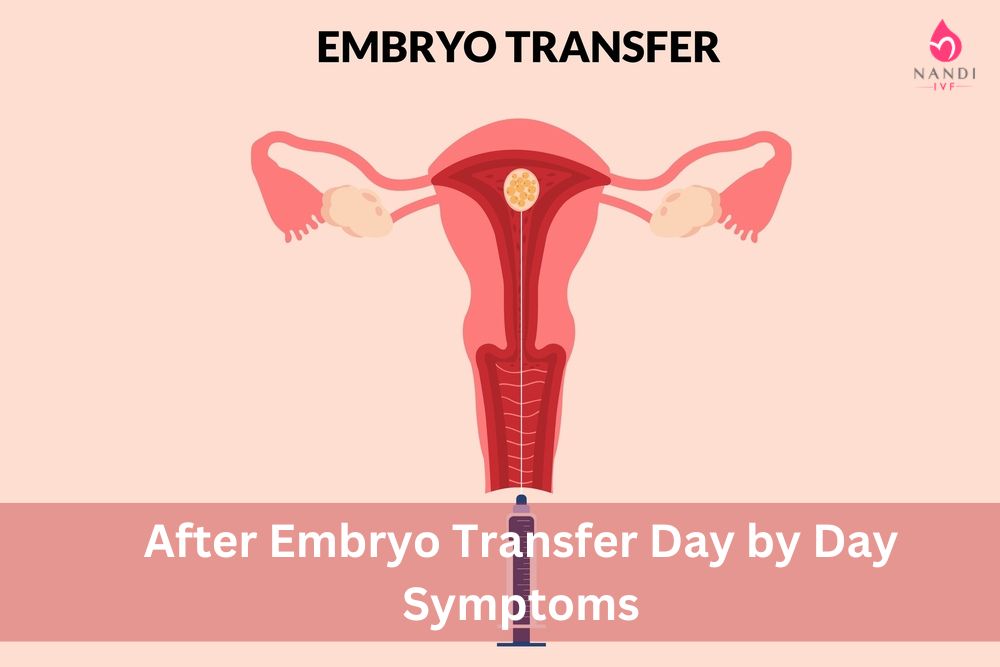

After Embryo Transfer Day by Day Symptoms: Stepping into parenting is one of the most significant and intimate phases in everyone’s life. Nonetheless, for most couples and people with fertility problems, IVF becomes a shining ray of hope. IVF is a revolutionary intervention in assisted reproductive technology that has transformed the way infertility is handled in the world, and embryo transfer forms a crucial stage of this treatment.
Embryo transfer represents the final stage of in vitro fertilisation (IVF) treatment. It is only after this stage that intended mothers can perform the pregnancy test. The procedure involves the delicate placement of the highest quality embryo into the patient’s uterus using a catheter. Many patients have concerns and questions regarding the possible symptoms that may occur following the embryo transfer. This post aims to explain the procedure; the most common after embryo transfer day by day symptoms, and their duration.
Embryo transfer is a straightforward and simple procedure that follows in vitro fertilisation (IVF). The procedure aims to enhance conception after fertilisation through the IVF process. The procedure starts with anaesthesia given, and then a slender catheter containing the specified number of embryos and a small amount of fluid is gently guided through the cervix into the uterus. The last step of embryo transfer includes the release of embryos into the uterus. After this, the patient needs to keep track of after embryo transfer day by day symptoms to ensure the success of the IVF treatment.
An embryo transfer typically lasts from 15 to 30 minutes. It involves the doctor using a speculum to insert a thin, long catheter into the vagina. The catheter containing the embryos transfers them into the uterus through the cervix. A small amount of fluid included in the catheter facilitates the process. After inserting the embryos, the patient can take rest if necessary. The procedure is the least invasive, and the post-embryo transfer duration maybe 30 minutes, depending on the patient’s comfort. The procedure can take two to four hours, including the setup, rest period, and transportation.
Read Also: The Science Behind No Symptoms After Embryo Transfer: Exploring the Possibilities
Post-blastocyst embryo transfer takes about 14 days before an intended mother can check for pregnancy. Following are some of the after embryo transfer day by day symptoms to look out for:
It is common for women to experience mild cramping during the first few days after the procedure.
Read Also: 7 Days After Embryo Transfer Symptoms
Read Also: What Foods to Avoid After Embryo Transfer: A Guide
After one week of embryo transfer, the placenta starts forming when an embryo becomes more established in the uterine lining. Some of the symptoms that appear during this phase include:
The journey to seeing positive pregnancy test results after embryo transfer can be challenging both – physically and emotionally. However, it is also essential to realise that each individual’s experience is unique, and after embryo transfer day by day, symptoms such as hormonal fluctuations, spotting, breast soreness, etc., may occur at different times and to varying degrees. The key is to remain calm and seek help from a fertility specialist or other health care provider if you have any worries. Remember that not every symptom indicates or guarantees a particular outcome. It is always a good decision to seek professional help and receive the best action and advice.
Read Also: What To Eat After Embryo Transfer IVF?
In vitro fertilisation, or IVF, emerges as a beacon of hope, offering individuals and couples the opportunity to realise their dreams of becoming parents while overcoming all fertility challenges. Understanding the intricacies of the step-by-step IVF journey and receiving proper guidance about after embryo transfer day by day symptoms makes it easier for them to manage expectations prudently and prioritise their mental well-being.
Nandi IVF strives to provide low-cost and high-quality pre and post-fertility treatments, care and guidance for couples facing difficulty in conception. The clinic offers various services to assist in solving issues experienced by both – men and women. The clinical, surgical, and psychological interventions with modern equipment and the highest international quality standards help individuals and couples receive unwavering support, a personalised approach to sailing through after embryo transfer day by day symptoms, and a secure environment to embark on the IVF adventure. Schedule an appointment today!
Read Also: Normal Pus Cells in Urine During Pregnancy: Comprehensive Guide
Read Also: Understanding the Signs of Bad Egg Quality – Taking the Right Steps
Read Also: 7 Steps to Getting Pregnant with Blocked Fallopian Tubes
Read Also: Comparing Tubectomy and Vasectomy: Which Option is Right?
1
2
3
4
5
6